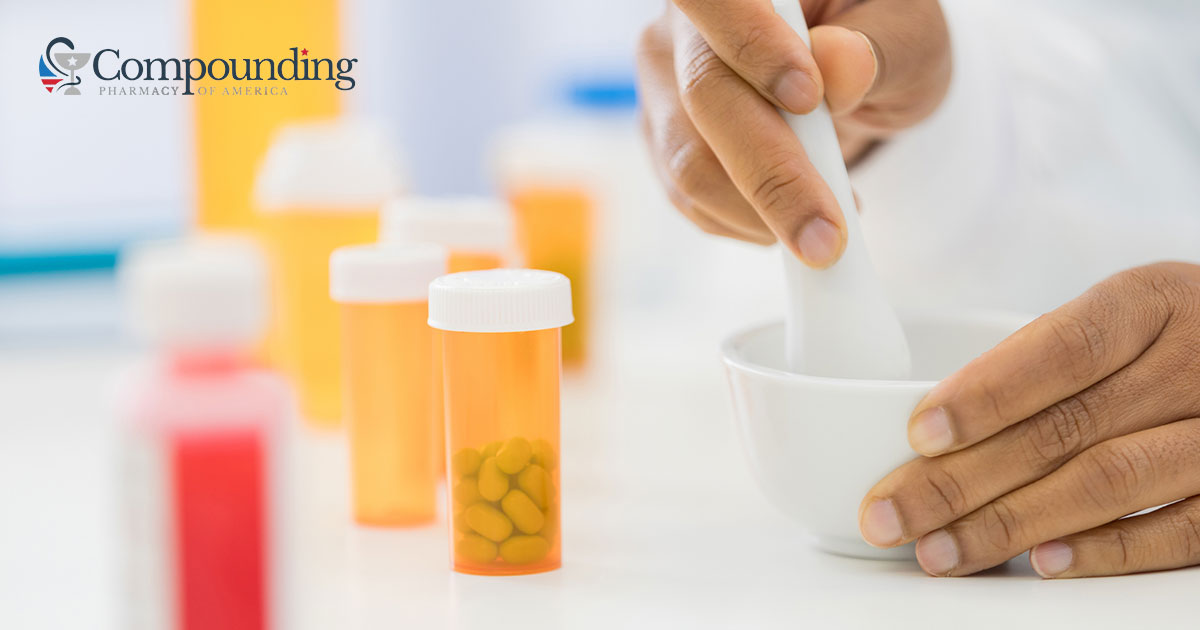
Pharmaceutical companies throughout the United States develop medications that must be approved by the Food and Drug Administration (FDA) before being sold in commercial environments. These medications are intended to be a single solution patients can use to treat some aspect of their physical or mental health. However, many people must take more than one medication at a time, and there are other individuals who cannot benefit from these solutions in their original formulations. When a commercial product isn’t ideal for your situation, compound medications may address your health needs.
Compounding Pharmacy of America is committed to providing reasonable and efficient solutions for people who require pharmacy compounding techniques. When you’re unable to take a prescribed medication, or there’s nothing on the market that can address your health issues, compound medications may be able to help you ensure you achieve the health benefits you need. Whether you are attempting to reduce the number of pills, you take every day, or you prefer gels, ointments, injectable medicine, or capsules, compounded medications can be created in an almost endless variety of forms.
Understanding Compounding Pharmacies
A compounding pharmacy is a pharmacy that creates specific medications designed to better meet patients’ needs. If you are unable to take the standard medication to meet your health requirements, a compounding pharmacy can create a unique prescription medication for your needs. A compounded medication may be altered to reduce the chances of side effects, combine multiple medications to create a med tailored specifically to your unique health condition or make the medication simpler to take.

For example, many patients have allergic reactions to certain medications, primarily because they contain ingredients like gluten. Instead of ceasing the use of the medication due to the side effects, compound medications can be created in alternative formulations that do not include gluten, or that can be applied topically. In general, should a medication cause unwanted side effects that are difficult to manage, a compounding pharmacy can create a more specific medication that doesn’t cause these side effects.
Here is a simple list of common reasons people may want to request a compounded version of a medication and their common solutions.
- The medication is not available in the custom strength or dosage the patient needs to treat their condition, so the compounding pharmacy creates a customized medication with the appropriate strength and dosage.
- The medication is not very appealing to a child or pet who refuses to take the medication, so the compounding pharmacy adds flavor or adjusts the consistency to make it more palatable.
- The medication contains an unwanted – but non-essential – ingredient, like a dye, common allergen, or another substance the user cannot tolerate, so the compounding pharmacy creates a version without that ingredient.
- The medication typically comes in a form the patient cannot tolerate – like an oral capsule for patients who cannot swallow – so the compounding pharmacy creates a topical version to replace it.
The Top Ten Compounded Medications
While there are multiple medications that can be compounded by pharmacists, we’ve outlined ten of the most common below. Each of these medications is designed to address specific, common health conditions people throughout the nation face.
1. Anastrozole
Anastrozole is commonly used to treat early breast cancer in women who have already experienced menopause. This medication typically comes in capsule form, and it is taken daily by mouth. Anastrozole works by lowering the amount of estrogen the body creates, making the cancerous cells decrease or stop growth entirely. An advantage of this medication is that it doesn’t require a specific diet to use, so you won’t have to worry about the medication containing ingredients such as lactose. If you’re a woman who has been diagnosed with early breast cancer, you may want to discuss anastrozole with your physician.
2. Chrysin
Another common compound medication that is often taken by capsule, chrysin is a flavonoid that is used in dietary supplements. Flavonoids are compounds found in fruits and vegetables that are recognized as an antioxidant and anti-inflammatory solution. Chrysin also boasts properties that protect the heart and improve athletes’ overall abilities. Athletes often take chrysin as a way to protect their health while they exercise and train rigorously. In order to reduce inflammation after difficult training, chrysin capsules can be taken orally as a way to recover.
3. Hydrocortisone
Should your body not produce enough cortisol, or if you’ve been diagnosed with hypopituitarism, cortisone capsules are an easy-to-use and reliable solution to manage your condition. Your body releases cortisol when you feel stressed, but if your body is producing too much or too little of this hormone, you can experience various health complications. Your blood pressure could increase, you may not respond to stress or danger as you typically would, or your body may struggle to produce glucose. Compounded hydrocortisone capsules may help keep your cortisol levels in check.
4. Liothyronine Sodium
Sometimes simply known as liothyronine, this medication is often taken orally for individuals suffering from hypothyroidism. Hypothyroidism occurs when your thyroid does not produce enough of the thyroid hormone, which is intended to help your body regulate blood pressure, digestion, and body temperature. A compounding pharmacy like ours can create a liothyronine sodium capsule that doesn’t aggravate other health complications you may have. This capsule can also be developed in a way that adheres to your current diet.

5. Naltrexone
The last capsule-based medication on our list, naltrexone capsules, is intended for individuals with alcohol use disorder (AUD) or opioid use disorder (OUD). This medication blocks opioid receptors in the body and suppresses an individual’s cravings for these substances. When someone becomes dependent on alcohol, prescription opioids, or illicit opioids, this medication can be used as a tool to address withdrawals and cravings and prevent relapse. While not intended as a cure for AUD or OUD, this medication can be used to enhance and accelerate the detoxification and recovery process while the person seeks help.
6. Tramadol
Tramadol is often prescribed to treat severe pain. Unlike over-the-counter pain medications like ibuprofen, Tramadol is meant to relieve pain for individuals who are struggling daily. Tramadol operates by changing how the brain and nervous system react to physical pain. While there is an option to take this medication via tablet, you can also ingest an oral liquid if necessary. When starting tramadol, you may start with a lower dosage at first so your body can slowly begin tolerating the medication, and as you slowly increase the amount, your body will adapt how it responds to pain.
7. Prednisone
Prednisone is also an anti-inflammatory medication that can also suppress the immune system. This medication is considered a corticosteroid, effective in reducing inflammation, improving asthma, and treating rashes. Prednisone differs from other anti-inflammatory medicines as this one can be taken orally or topically. Creams and ointments can be produced and applied to specific areas of the body that feel inflamed. As the body absorbs the cream into the skin, it can be transferred into the inflamed tissues. Should you need a stronger dose, you can inject the medication directly.
8. Sucralfate
Sucralfate is primarily prescribed for intestinal ulcers. This medication is most often taken via liquid at least once a day. Sucralfate adheres to damaged ulcer tissue in the intestines and protects against enzymes and acids that could cause further damage. This gives your intestines time to repair and defend themselves against future ulcers that could arise.
Another significant advantage of sucralfate is that both humans and pets can benefit from this medication if there are ulcerous issues present in the intestines. Digestive issues, when left unchecked, can quickly become troublesome and difficult to manage, which is why sucralfate is such a commonly prescribed medication.
9. Hydrogen Peroxide
Arguably the most common substance on our list, hydrogen peroxide is often used as a quick solution for wound care in emergency situations. Hydrogen peroxide is a colorless liquid that is meant to be applied topically only. This is meant to disinfect the area by killing dangerous microorganisms. Hydrogen peroxide can be compounded to higher potencies, which may be useful for treating lesions associated with seborrheic and actinic keratosis.
10. Gabapentin
Gabapentin is one of the most common and efficient topical and oral medications used as a pain reliever and nerve damage reliever. While Gabapentin is often taken as an oral tablet, it can also be prescribed as a cream. When applied to the skin, it can bypass degradation from stomach acid, liver metabolism, and gastrointestinal sensitivity, making this an effective solution for healing. Gabapentin is also prescribed for conditions such as shingles, partial onset seizures, and other similar conditions.
Other Types of Compounded Medications
The ten medications we’ve outlined above are by far the most common ones on the market, but there are plenty more medications you can have compounded.
For example, suppositories can be developed for individuals who cannot ingest their medication, don’t want to be injected, or cannot take it topically. Suppositories are meant to be taken through the rectum or vagina, which is then absorbed and dissolved inside the body. If someone has a problem swallowing, they can be given a suppository that can calm down many different health conditions, such as irritable bowel syndrome (IBS), hemorrhoids, and other digestive issues.

While some medications, like prednisone, can be taken via injection, other compound medications can be injectable, as well. Certain medical conditions may require the use of injection to make a significant difference, such as diabetes, measles, or fertility issues. Also, these medications can be absorbed via sprays or inhalation devices, giving you more alternative options if you cannot tolerate oral medication.
Let Us Compound A Personalized Medication for You
At Compound Pharmacy of America, we strive to provide accessible and reliable medication solutions for a wide range of health issues in both humans and their pets. We know how limiting certain medications can be, especially if you have other conditions that prevent you from taking medications the traditional way. Thankfully, compounded medication can be an efficient method of treating your health condition without aggravating the body.

Our team listens closely to patients’ concerns and creates customized medication that will assist in recovery and healing without adding complicating factors. No matter what health condition you’re struggling with, you can access beneficial treatments without unnecessary hurdles or side effects. To learn more about compounded pharmaceutical medications, the conditions they can help treat, or what our compounding pharmacy does, contact us today.
Resources :
- Jersey, D. M. L., PharmD, BCPS, BCGP, BCPP, BCACP Hackensack Meridian Health Eatontown, New. (n.d.). Pros and Cons of Pharmacy Compounding. Www.uspharmacist.com.https://www.uspharmacist.com/article/pros-and-cons-of-pharmacy-compounding
- Mayo Clinic. (2020, December 16). Prednisone and other corticosteroids: Balance the risks and benefits. Mayo Clinic. https://www.mayoclinic.org/steroids/art-20045692
- MedlinePlus. (2019, October). Tramadol: MedlinePlus drug information. Medlineplus.gov. https://medlineplus.gov/druginfo/meds/a695011.html
- SAMHSA. (2023). Naltrexone. Www.samhsa.gov. https://www.samhsa.gov/medications-substance-use-disorders/medications-counseling-related-conditions/naltrexone
- Cleveland Clinic. (2022, February 15). Thyroid Hormone: What It Is & Function. Cleveland Clinic. https://my.clevelandclinic.org/health/articles/22391-thyroid-hormone
- Liothyronine (Oral Route) Description and Brand Names – Mayo Clinic. (n.d.). Www.mayoclinic.org. https://www.mayoclinic.org/drugs-supplements/liothyronine-oral-route/description/drg-20069093
- NHS Choices. (2020). Hydrocortisone tablets. NHS. https://www.nhs.uk/medicines/hydrocortisone-tablets/
- Anastrozole: MedlinePlus Drug Information. (n.d.). Medlineplus.gov. https://medlineplus.gov/druginfo/meds/a696018.html
- webMD. (2019). Drugs & Medications. Webmd.com. https://www.webmd.com/drugs/2/drug-76035/hydrogen-peroxide/details
- Sucralfate: MedlinePlus Drug Information. (n.d.). Medlineplus.gov. https://medlineplus.gov/druginfo/meds/a681049.html

Chief Executive Officer, The Compounding Pharmacy of America
Victor Poteet, Pharm.D. graduated Magna Cum Laude from Mercer University School of Pharmacy and received his Masters in Business Administration from the University of Miami’s Miami Business School. Since graduation, Victor accepted a pharmacist position at Vanderbilt University Medical Center in Nashville. At Vanderbilt, Dr. Poteet received extensive training in sterile products compounding.
Victor accepted a position as a pharmacist with a compounding pharmacy in North Carolina, where he further expanded his practical experience in both sterile and non-sterile compounding. Some of Victor’s responsibilities include creating corporate strategy and culture and allocating resources based on the company’s goals.
 Subscribe to Our Newsletter
Subscribe to Our Newsletter


